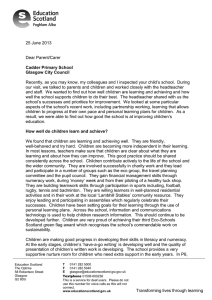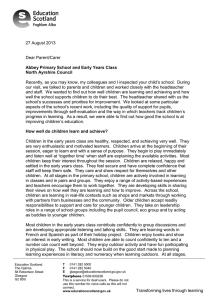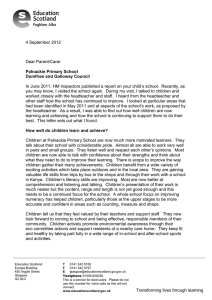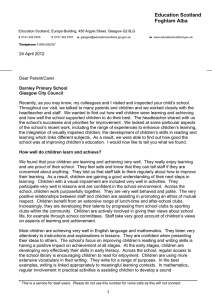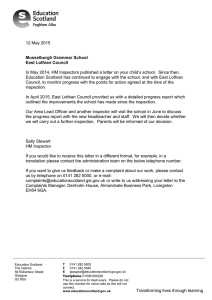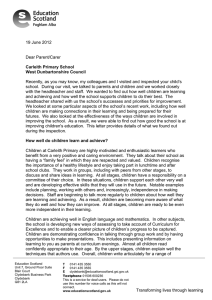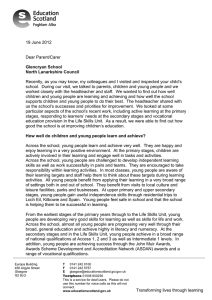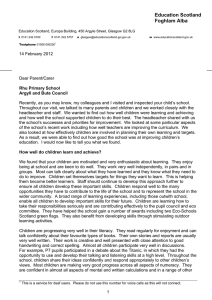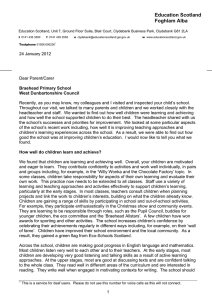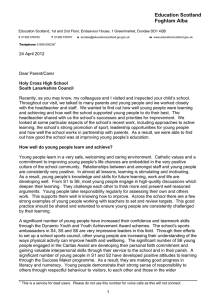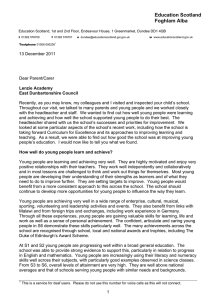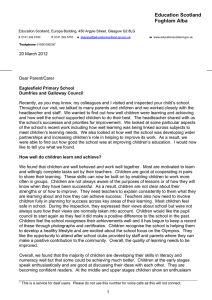22 January 2013 Dear Parent/Carer your child’s school.
advertisement
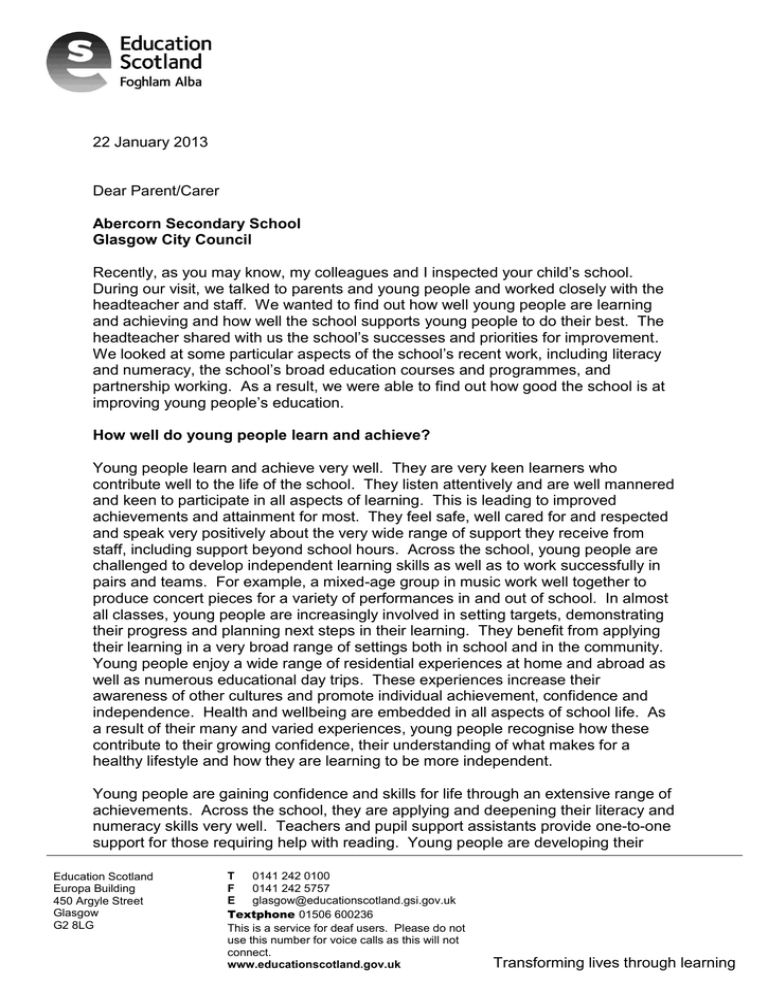
22 January 2013 Dear Parent/Carer Abercorn Secondary School Glasgow City Council Recently, as you may know, my colleagues and I inspected your child’s school. During our visit, we talked to parents and young people and worked closely with the headteacher and staff. We wanted to find out how well young people are learning and achieving and how well the school supports young people to do their best. The headteacher shared with us the school’s successes and priorities for improvement. We looked at some particular aspects of the school’s recent work, including literacy and numeracy, the school’s broad education courses and programmes, and partnership working. As a result, we were able to find out how good the school is at improving young people’s education. How well do young people learn and achieve? Young people learn and achieve very well. They are very keen learners who contribute well to the life of the school. They listen attentively and are well mannered and keen to participate in all aspects of learning. This is leading to improved achievements and attainment for most. They feel safe, well cared for and respected and speak very positively about the very wide range of support they receive from staff, including support beyond school hours. Across the school, young people are challenged to develop independent learning skills as well as to work successfully in pairs and teams. For example, a mixed-age group in music work well together to produce concert pieces for a variety of performances in and out of school. In almost all classes, young people are increasingly involved in setting targets, demonstrating their progress and planning next steps in their learning. They benefit from applying their learning in a very broad range of settings both in school and in the community. Young people enjoy a wide range of residential experiences at home and abroad as well as numerous educational day trips. These experiences increase their awareness of other cultures and promote individual achievement, confidence and independence. Health and wellbeing are embedded in all aspects of school life. As a result of their many and varied experiences, young people recognise how these contribute to their growing confidence, their understanding of what makes for a healthy lifestyle and how they are learning to be more independent. Young people are gaining confidence and skills for life through an extensive range of achievements. Across the school, they are applying and deepening their literacy and numeracy skills very well. Teachers and pupil support assistants provide one-to-one support for those requiring help with reading. Young people are developing their Education Scotland Europa Building 450 Argyle Street Glasgow G2 8LG T 0141 242 0100 F 0141 242 5757 E glasgow@educationscotland.gsi.gov.uk Textphone 01506 600236 This is a service for deaf users. Please do not use this number for voice calls as this will not connect. www.educationscotland.gov.uk Transforming lives through learning performance skills by participating in local and national festivals, and their art work has been recognised widely. Young people gain personal and citizenship skills through their roles in leading charity work, as members of the Eco-Schools Scotland group, by taking part in equality and diversity activities and as pupil council members. They also take part and are successful in a wide range of sporting activities with a few representing their country at the World Special Olympics in Athens. They achieve in a broad range of national qualifications at a range of levels. In addition, an increasing number of young people are achieving success through a wide range of award schemes such as the Duke of Edinburgh’s Award. When they leave school, almost all young people enter further education, employment or training. How well does the school support young people to develop and learn? Across the school, young people enjoy very positive relationships with staff that are helping them to become confident and highly motivated to learn. Their learning needs are identified effectively by a well-planned admissions process. Post-placement reviews identify and address any difficulties at an early stage. Staff make effective use of individual pupil summary profiles outlining barriers to learning and suggested approaches to dealing with these difficulties. There are regular opportunities for young people and their parents/carers to review and refresh their targets and to take account of changing circumstances. Most staff plan learning using Curriculum for Excellence guidance and are taking very good account of learners’ needs through a range of engaging tasks and activities. Teachers are constantly developing their courses and programmes to try to meet the needs and interests of the young people. However, staff need to ensure that they help young people to see the links across learning. Pupil support assistants successfully help to address individual needs, including keeping young people safe. Staff work proactively with partners, including those from health, further education and local businesses, to support young people both in and out of school. There is scope to develop these partnerships further to enhance the school’s approach to supporting individual needs. How well does the school improve the quality of its work? The recently-appointed headteacher has made a very positive start in leading the school. She has gained the support of staff and parents. She will benefit from the continued support of the education authority in taking forward improvements in the work of the school. All staff are committed to improving their practice and to supporting the headteacher to improve achievement, learning and teaching. The school gathers a range of evidence about the quality of its work, including asking parents and pupils for their views. It now needs to continue to develop ways of using this evidence to make improvements in learning and teaching, and to monitor their impact. There is scope for the professional learning undertaken by staff to be more closely linked to the school’s agreed priorities for improvement. This inspection of your school found the following key strengths. Happy, confident young people who are enthusiastic about their learning and benefit from the strong relationships with staff and each other. 2 Dedication of staff to meeting the social and emotional needs of young people. Wide range of opportunities for young people to develop confidence, citizenship skills and resilience. Flexibility of the school’s approach to developing the curriculum to meet the needs of all learners. Young people’s levels of achievement and attainment which have a positive impact on their life chances. We discussed with staff and the education authority how they might continue to improve the school. This is what we agreed with them. Continue to develop the curriculum to help young people see the links across learning. Continue to refine how the school evaluates its work with a greater focus on learning and teaching. What happens at the end of the inspection? We are satisfied with the overall quality of provision. We are confident that the school’s self-evaluation processes are leading to improvements. As a result, we will make no further visits in connection with this inspection. The local authority will inform parents about the school’s progress as part of the authority’s arrangements for reporting to parents on the quality of its schools. John Brown HM Inspector Additional inspection evidence, such as details of the quality indicator evaluations, for your school can be found on the Education Scotland website at http://www.educationscotland.gov.uk/inspectionandreview/reports/school/primsec/Ab ercornSchoolGlasgowCity.asp If you would like to receive this report in a different format, for example, in a translation please contact the administration team on the above telephone number. If you want to give us feedback or make a complaint about our work, please contact us by telephone on 0141 282 5000, or e-mail: complaints@educationscotland.gsi.gov.uk or write to us addressing your letter to the Complaints Manager, Denholm House, Almondvale Business Park, Livingston EH54 6AG. 3
